15 collagen supplements you need to know
What to eat to supplement collagen? 15 collagen supplements you need to know
Contents
- 1 What is Collagen? Causes of collagen deficiency
- 1.1 Demystified: Benefits of drinking coffee every morning
- 1.2 WHAT IS COLLAGEN? SPECIAL BENEFITS THAT COLLAGEN BRINGS
- 1.3 Bone broth
- 1.4 Tomatoes
- 1.5 Chicken
- 1.6 Organ meat
- 1.7 Fish, seafood and snails and clams
- 1.8 Bell pepper
- 1.9 Egg whites
- 1.10 Citrus fruits
- 1.11 Berries
- 1.12 Tropical fruits
- 1.13 Garlic
- 1.14 Green vegetables
- 1.15 Aloe vera
- 1.16 Beans
- 1.17 Cashews
What is Collagen? Causes of collagen deficiency
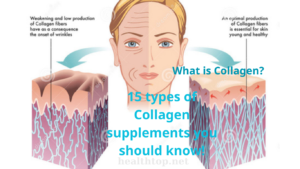
Collagen is a fibrous protein that accounts for about 30% of the protein in the body, giving the skin structure softness, elasticity, smoothness and luster.
Collagen depletion is a natural process of the body. However, there are also a few causes of deficiency such as:
UV rays damage the DNA of collagen-producing cells under the skin, promoting the production of harmful free radicals that degrade collagen in the skin.
Smoking causes many negative effects on health, promoting premature aging.
A diet high in sugar, processed foods, etc. stimulates the immune system, promotes inflammation, causing collagen to harden and break down, weakening the skin and promoting premature aging. .
Stress, tension, and insomnia trigger the inflammatory process, increasing the hormone cortisol, reducing the body’s ability to produce natural collagen.
Genetic.
Age also causes collagen deficiency.
Demystified: Benefits of drinking coffee every morning
WHAT IS COLLAGEN? SPECIAL BENEFITS THAT COLLAGEN BRINGS
-
Bone broth
Boiling animal bones with water creates the finished product, bone broth containing about 5g of collagen in 240ml. At the same time, bone broth also contains calcium, phosphorus, magnesium, glucosamine, chondroitin, amino acids and many other nutrients.

However, the difference in each type of bone broth depends on the quality of the bones as well as other ingredients used when stewing. Therefore, to ensure the quality of broth used in soups, choose bones from reputable establishments.
-
Tomatoes
Tomatoes are a source of nearly 30% of vitamin C, which both strengthens the immune system and helps stimulate collagen production. From there, it contributes to promoting new cell regeneration, healing wounds quickly, improving elasticity and rejuvenating the skin.
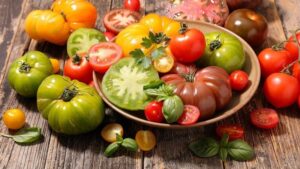
In addition, lycopene in tomatoes is also an antioxidant, protecting and contributing to preventing the harmful effects of ultraviolet rays on the skin.
-
Chicken
Collagen is a natural protein found in chicken, usually taken mainly from chicken breast cartilage. One study provided evidence that consuming chicken breast cartilage extract for 6 weeks increased collagen content by 6.36%, reducing physiological processes associated with aging and signs of aging such as wrinkles. .

-
Organ meat
Another natural source of collagen is organ meat such as liver, heart, brain and kidney, etc. Organ meat usually has 1.5 – 3 times more collagen than muscle meat. Therefore, add this source of collagen to your diet in a variety of ways.
-
Fish, seafood and snails and clams
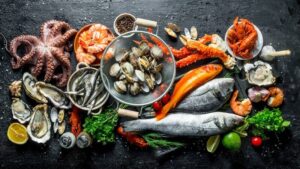
Collagen sources from the sea are concentrated in bones, skin and scales found in fish, seafood, snails, oysters, etc., which is one of the easiest to absorb.
Some researchers use fish skin as a source of collagen peptide supplements for the body thanks to its similarity to human collagen structure.
In addition, omega-3 fats as well as the micronutrient zinc can prevent dehydration between skin layers, promoting collagen production.
-
Bell pepper

In 100g of bell peppers, it will provide about 80.4mg of vitamin C [4]. The antioxidant properties of vitamin C found in bell peppers help even out skin tone, fight aging, protect and increase collagen production in the body.
In addition to vitamin C, bell peppers also contain capsaicin, a natural anti-inflammatory and anti-aging compound.
-
Egg whites
Egg whites contain large amounts of proline, one of the amino acids necessary for collagen synthesis in the human body.
-
Citrus fruits
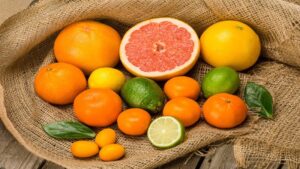
One of the foods that supplement collagen is citrus fruits such as oranges, lemons, tangerines, grapefruit, etc. These fruits provide vitamin C necessary for stimulating collagen synthesis and supporting collagen synthesis. Antioxidant protection, against the harmful effects of ultraviolet rays
Therefore, getting enough vitamin C through citrus fruits is very important to make your skin more youthful and plump.
-
Berries
In addition to citrus fruits, berries such as strawberries, blueberries, raspberries, etc. are also another great source of vitamin C that helps stimulate the body’s collagen production.

Each 100g of strawberries has 60mg of vitamin C
100g of raspberries contains about 26.2mg of vitamin C
Furthermore, berries also contain many antioxidants that help protect the skin from damage, making the skin white, pink and smooth.
-
Tropical fruits
Tropical fruits such as mango, kiwi, pineapple, guava,… are also on the list of fruits rich in vitamin C, effective in increasing the body’s collagen.
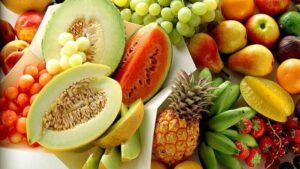
In addition, guava also contains a small amount of zinc, an element that plays an important role in collagen synthesis, helps repair cells and helps protect collagen in the body from damage.
-
Garlic
Garlic is assessed by nutritionist Gabriel as having a high sulfur trace mineral content, which helps synthesize and prevent the breakdown of collagen.
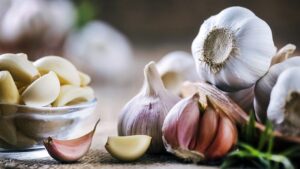
In addition, garlic also contains fiber, vitamins and minerals, especially selenium, which helps slow down the aging process and prevent some chronic diseases such as cardiovascular disease and cancer.
However, garlic is only safe in normal amounts. Eating too much garlic, especially raw garlic, can cause heartburn, stomach pain or increase the risk of bleeding if you are using blood thinners. Therefore, consider using garlic in an appropriate amount.
-
Green vegetables
Green vegetables such as kale, spinach, cabbage, lettuce, etc., in addition to playing an important role in a healthy diet, also contain chlorophyll which is known for its antioxidant properties.

Several studies have shown that consuming chlorophyll increases collagen precursors in the skin, improving wrinkles and elasticity in 90 days.
-
Aloe vera
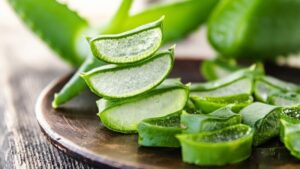
Aloe vera has been shown to increase collagen production in the skin, helping to reduce wrinkles and reveal more radiant, youthful skin.
Furthermore, aloe vera itself has been shown to have anti-aging benefits, improving wrinkles in 8 weeks in people 40 years of age and older.
-
Beans
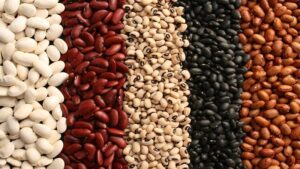
Beans are a protein-rich food that often contain amino acids necessary for collagen biosynthesis. Plus, many of them are rich in trace copper, another nutrient essential for collagen production.
-
Cashews
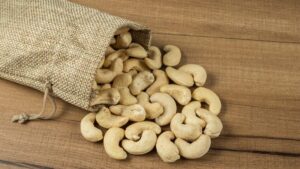
Cashew nuts contain many nutrients that are beneficial for the body. In addition, copper and zinc found in cashews help produce various enzymes, forming hemoglobin and collagen.
+++ Reference source:
- Ingestion of BioCell Collagen®, a novel hydrolyzed chicken sternal cartilage extract; enhanced blood microcirculation and reduced facial aging signs
- The Roles of Vitamin C in Skin Health
- The Role of Functional Foods in Cutaneous Anti-aging
- Comparative anti-inflammatory properties of Capsaicin and ethyl-aAcetate extract of Capsicum frutescens linn [Solanaceae] in rats

